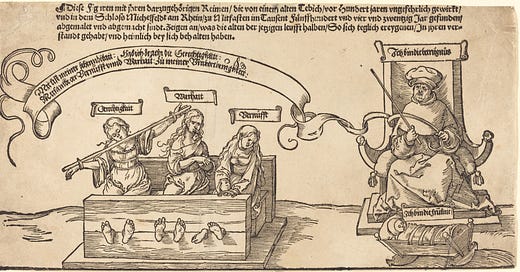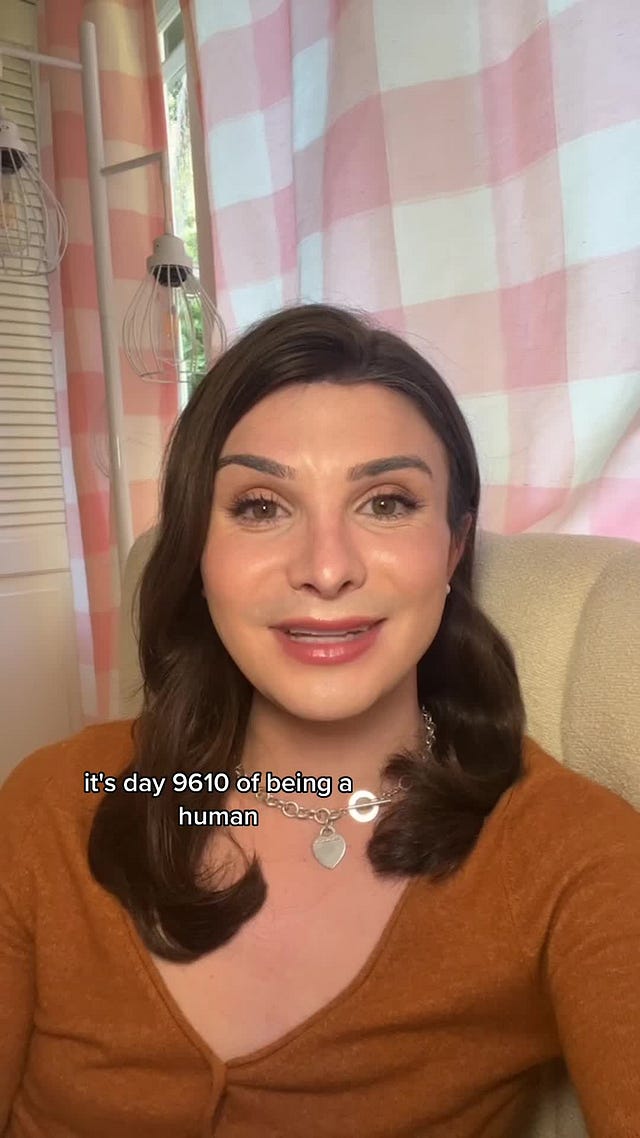Among the many contradictions posed by the liberal story of transgender visibility is the myth that we were ever invisible. Transgender people, for better and for worse, have been a feature of the mass media landscape for as long as there has been mass media. Trans women especially have long been trotted out as villains, deviants, honeypots, mutants, harpies, scolds, charlatans, and bitches in works of fiction and nonfiction alike, and few stewards of these stereotypes were as eager to indulge in them as Jerry Springer.
Springer, the politician and talk show provocateur who passed away this week at the age of 79, ensured an entire generation of trans women grew up knowing our place in the culture, the bedroom, and society at large. Trans women were routinely invited on to the (at least partially-scripted) daytime talk show he hosted for nearly three decades, marching in front of the roaring crowd of hooting gawkers to shock, scream, cry, and betray. Scan the chyrons used when trans guests were on the show— “TRANSSEXUAL SECRETS;” ‘TRANNY TAKEDOWN;’ ‘T.H.OT. YOU WERE A GIRL”—and you get the gist of the roles these women were cast in and the stories they tell. And lest you believe these are shameful relics of a less-enlightened time long since past, please enjoy this six-minute compilation cut uploaded by the show’s official YouTube page in 2019.
Giving any moral lecture about decency and dignity to a show whose entire brand became shorthand for sordid conflict would be absurd and pointless. I don’t even think the show was inherently exploitative or manipulative of their guests—all of the trans women in the above clips knew what they were doing, what the show was about, and how they would be viewed by the show’s live and televised audience.
Even if, as has long been suspected of the show’s guests, these women are paid actors, much of the shame and criticism aimed at the show is just a workaround way of shaming the women themselves, mirroring the kinds of scolding sex workers—who are disproportionately trans—know all too well. One could—and many did—praise The Jerry Springer Show as a rebellious and loudly queer anecdote to the censorious attitudes of conservative politics in the 1990s or the efforts at queer assimilation led by the likes of Andrew Sullivan. It’s an old and self-defeating instinct in queer activism to repel the elements of the queer community furthest from the realm of heteronormative privilege—a category trans people have long resided in—and Springer gave those elements visibility in a way that was so low-minded and openly-degenerate it was practically camp.

 Tiktok failed to load.
Tiktok failed to load.Enable 3rd party cookies or use another browser
Perhaps most damning of all, however, is what that trans visibility did not yield. Unlike the last decade of trans visibility, the depictions within these narrow and exploitative tropes didn’t challenge what society thought about trans people—they merely reflected back at them the transphobia and misogyny they already believed. It’s why public narratives about us before the 2010s didn’t inspire the level of organized political backlash we’re now experiencing—trans women had a role in public life and were restrained to it. It was only once the culture began to show us outside of that role that we became the main character in the nightmares of revanchists, demagogues, and politicians currently trying to banish our health care.
So what was that role? What purpose are we supposed to serve in the eyes of cis-hetero culture? What stories and narratives are reasonably kettled into? What, in other words, are trans women for?
Conversations about gender are most frequently conversations about labor—emotional, sexual, and reproductive forms of work—and who is entitled to benefit from it. When Steven Crowder berates his pregnant wife Hilary for failing to perform her “wifely” duties, he’s criticizing her for failing at the job he believes she and everyone else with a uterus are supposed to perform as emotional pacifier and servant. When Don Lemon describes Nikki Haley as past her “prime,” he doesn’t mean she’s aged past her potential as a human but in fact aged past her fertility—her ability to perform unpaid reproductive labor. When countless women and queer people are derided, threatened, beaten, raped, or killed, it’s an effort to force them to perform not just their gender assignment but their literal assignment—the labor they’re “supposed” to perform in an arrangement portrayed as inevitable and ordained by God, nature, or both. From this perspective, misogyny is the stern boss patrolling the factory floor, keeping workers in line, and rooting out potential signs of rebellion.
In her seminal work Down Girl, Oxford philosopher Kate Manne warns against the “naive conception of misogyny,” the viewpoint that “misogyny is primarily a property of individual agents (typically, although not necessarily, men) who are prone to feel hatred, hostility, or other similar emotions toward any and every woman, or at least women generally, simply because they are women.” Instead, suggests Manne, misogyny “ought to be understood as the system that operates within a patriarchal social order to police and enforce women’s subordination and to uphold male dominance.” This narrow and interpersonal view of misogyny has many close relatives in narrow conceptions of ableism or racism as simply and solely personal animus, restraining conversations about ending it to efforts to change hearts and minds while largely ignoring laws and institutions.
Transphobia, too, has its own naive conception as a mere irrational hatred, one that ignores the purpose it serves in enforcing the same patriarchal order upheld by the misogyny evinced by Crowder and Lemon. Take, for example, the month-long tirade aimed squarely at actress and model Dylan Mulvaney for, best I can tell, committing the heinous crime of engaging in corporate sponcon for Bud Light. Nearly a year ago, I wrote that Mulvaney’s popularity held promise as an example of the power of transgender joy in dispelling the myths that suggest we lead, as sociologist Laurel Westbrook puts, “unlivable lives.” When the only thing cis people hear about trans people is our misery and suffering, it reinforces the notion that the current gendered order is inevitable and any lives pursued outside of it doomed to fail.
It’s why, I suspect, Mulvaney is the target of so much unfiltered rage and dehumanization—more so than trans people with similarly-large platforms. Her online presence is eternally joyful (some might reasonably say manic) and her continued embrace by mainstream society, including over 10 million TikTok followers, suggests the people who like the vision of trans life she presents are no small progressive niche. Combine that with her exuberant femininity (which, like most trans femininity, captures and reinvents the aesthetics which are supposed to act as the uniform for labor that is devalued and exploited) and she is a heat-seeking missile dispelling the myths at the heart of the reactionary worldview of her critics.
 Tiktok failed to load.
Tiktok failed to load.Enable 3rd party cookies or use another browser
Or take Montana State Representative Zooey Zephyr or who was largely expelled by the state’s Republican leadership after she spoke against a proposed restriction on gender-affirming care (since signed into law). In the stories told by the politicians writing and passing bans like Montana’s, trans people are at best pathetic eunuchs and at worst decadent perverts—one of Rep. Zephyr’s colleagues in the state House even said they’d rather their own child kill themselves than pursue a medical transition. These myths about trans people are much more difficult to uphold when one of them is standing next to you, speaking eloquently and gracefully, with a vote that counts as much as yours.
In both instances, we have trans women betraying the scripts still written across the cultural, social, and political realms and being punished and silenced for it. Even more illustrative is the fact Mulvaney and Zephyr, for all the furor they inspire, still benefit from a wealth of privilege as thin white women, emphasizing how narrow the paths toward influence, power, and dignity still remain for trans people who are not. Consider Oklahoma State Representative Mauree Turner who, like Zephyr, was censured over their opposition to an anti-trans bill back in March. Unlike Zephyr, Turner, who is both Black and Muslim, did not receive a national spotlight despite their disenfranchisement being equally outrageous and undemocratic.
If trans people are not allowed to be joyful or powerful, then, it makes sense to find what roles we were allowed to play. The anti-trans right is fighting to reinstate the cultural and political consensus that believed the narratives told on Jerry Springer’s show and across the entire culture—that our lives are unlivable, our bodies unlovable, and our freedom too dangerous to allow. The purpose trans people, and trans women especially, are “supposed” to serve in the conservative mindset is as a cautionary tale, a warning to what happens to those who dare to reject their assignment and scare everyone else from defying the gendered expectations everyone must navigate. In the best-case scenario for conservatives, trans women are not erased entirely but instead put in stocks in the town square and intentionally displayed for mockery, abuse, and violence.
After Jerry Springer’s death earlier this week, many shared a post-show monologue he gave urging his audience to show empathy and compassion to trans people in 1993. “If our guests today have body parts that don't relate to who they are,” said Springer, “why can't they fix that? Maybe the point here is not to judge a person until you've walked a mile in his shoes, even if they are high-heeled.” Likewise, in 2015, he pushed back against any criticism of his show as transphobic (though he did promise to stop using the word “tranny”) assuring us he held nothing against trans people personally. But like misogyny, transphobia is as transphobia does, and the intent that lived in his heart is functionally meaningless. What is meaningful is the legacy he’s left, reminding us of the roles much of the straight world prefers we take up and to what fates they’d rather we be assigned.




Brilliant, devastating...maybe even hopeful if hope can be heard in the key of defiance. Thank you.
Excellent read! Aside from your passion to bring attention to the injustices assailing the transgender community, I'm very grateful for your research and elegant way with words; it helps me to more clearly articulate my concerns with those who will listen.
I do hope to be in a better financial position soon in order to contribute to your work. I'm very aware of the forces of darkness arrayed against us, and I know that it is real, and very important work that you are doing.
Much love to you,
Lyra